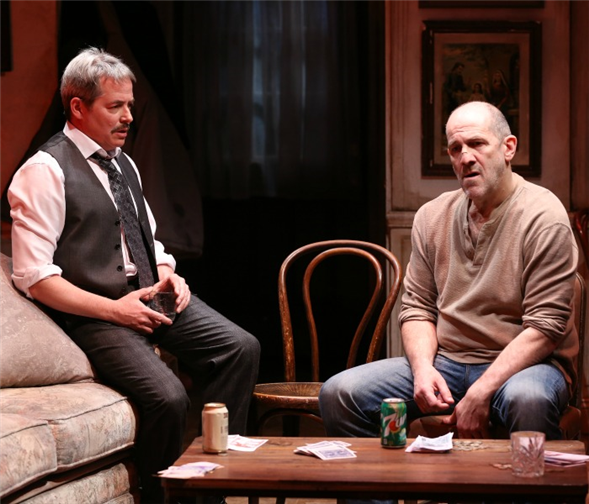Translate Page

Irish Rep revives Conor McPherson's Tony-nominated play
---
The Seafarer, Conor McPherson's tale of despair and redemption on a drunken Christmas Eve, is a decidedly male affair. In fact, according to Ciarán O'Reilly, the director of Irish Repertory Theatre's current revival, "This play could be called The Absence of Women."
The action takes place in a grubby man cave where some desperate working-class Irishmen play a poker game that turns out to have extremely high stakes. Unfortunately, these lost souls have trouble seeing what's right in front of their eyes. How will they ever be able to spot a winning hand?
"They're all kind of blind in the play," says O'Reilly. "There's Richard (Colin McPhillamy), who's actually blind. Ivan (Michael Mellamphy) is blind without his glasses. Nicky (Tim Ruddy) goes blindly from job to job. And Richard's brother Sharky (Andy Murray) -- he just fucked everything up from his relationship with his wife and kids to his jobs. He's blind to his own salvation. They're all trying, in some way or another, to find the light."
Throughout The Seafarer, these men talk -- make that complain -- about the women in their lives, the ones who call wondering where they are and lock them out of the house when they drink too much. But behind their bitching is a palpable sadness. "The play does not speak very well of the Irish masculine, but you feel so bloody sorry for them," O'Reilly says. "I do, at least."
While practical problems plague these men, mystical forces are what drive the story once the mysterious Mr. Lockhart arrives. Played by two-time Tony winner Matthew Broderick, Lockhart knows a secret from Sharky's past that threatens to derail his life altogether.
Sharky is perhaps the most pitiable of the bunch and his metaphysical struggle with Lockhart serves as the heart of the play. Ciarán Hinds was chilling as Lockhart in the 2007 Broadway production. But Broderick takes a different approach to the character, leaning on his amiable and understated demeanor. "I feel Matthew gets inside the skin of somebody," says O'Reilly, who directed Broderick in a revival of McPherson's Shining City at Irish Rep in 2016. "And he does it in a very deceptively subtle way."
When Sharky and Lockhart are alone onstage, it's quiet and tense. That's a stark contrast to the boisterous full-cast scenes in which the inebriated men vacillate between fellowship and fury. And yet these are Irish Catholics who, despite their flaws, believe in good and evil, Heaven and Hell. Portraits of Jesus and the Virgin Mary adorn the walls next to advertisements for Jameson Irish Whiskey.
Although most of the actors had never worked together before, O'Reilly says their camaraderie came quickly. They also had excellent instincts about each of their characters. "From the get-go of the production, I'd be watching whatever their first intentions were," he says. "Usually the first ones were the correct ones." Throughout rehearsals, O'Reilly encouraged the cast to play everything naturally -- only the copious amounts of alcohol were faked.
"That's for after the show opens," he jokes. "We keep on meaning to go some night and play a few games of poker together and drink and see how that goes."
To read about a student's experience at The Seafarer, check out this post on TDF's sister site SEEN.
---
Carey Purcell writes about pop culture and politics for Vanity Fair, The Village Voice, Politico, and other publications, and blogs at CareyPurcell.com. Follow her on Twitter at @careypurcell. Follow TDF at @TDFNYC.
Top image: Matthew Broderick and Andy Murray in The Seafarer. Photos by Carol Rosegg.
TDF Members: Go here to browse our latest discounts for dance, theatre, and concerts.